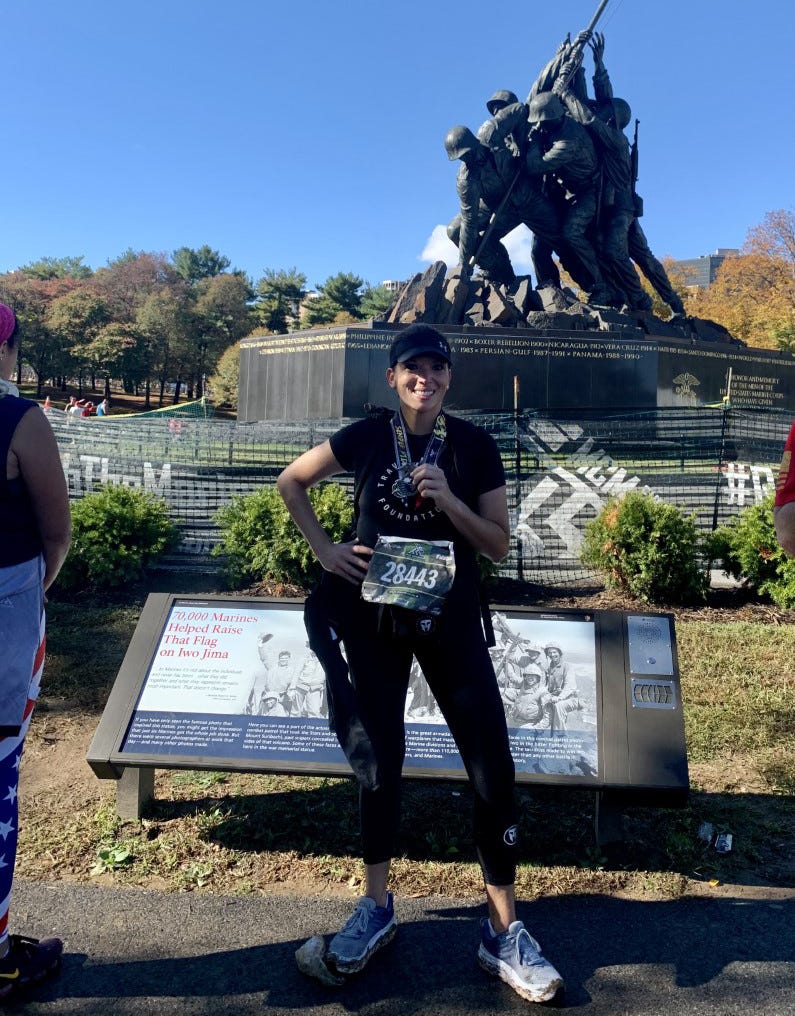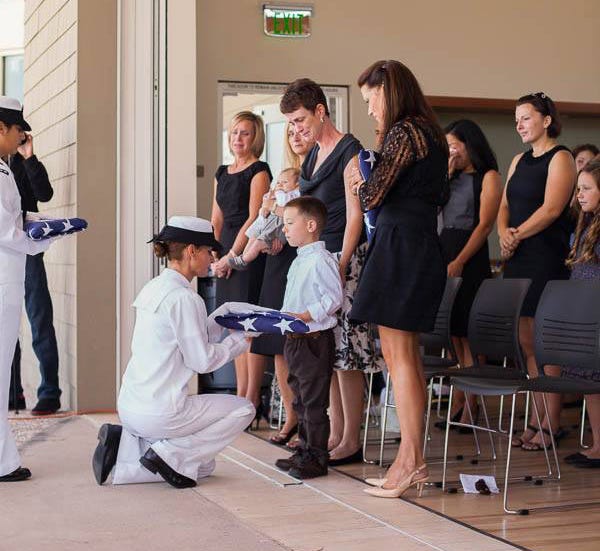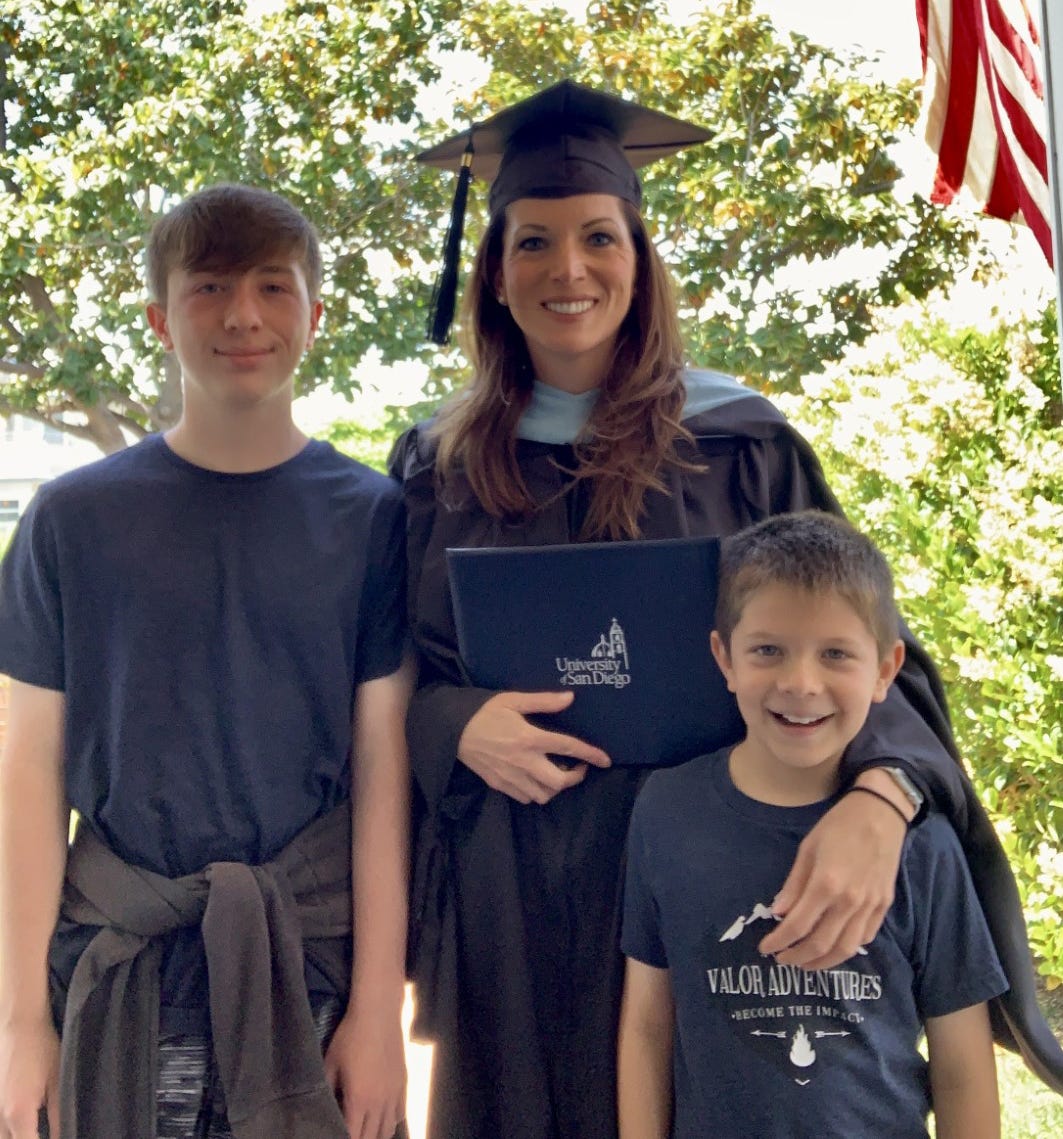Transitioning from tragedy: Theresa Jones discovers strength, resilience after Navy husband’s death
By Nicole Sours Larson

More than 10 years have now passed since that awful September day when Theresa Jones’ whole life fell apart and tragedy enveloped her young family.
The Gold Star wife, who turns 44 on Dec. 7, lost her husband, Lt. Cmdr. Landon Jones, just five days before what would have been their 10th wedding anniversary in September 2013.
Jones had recently given birth to her second son when the knock no one ever wants came on the door of her Coronado home, where the family had lived since 2012. Intuitively she knew why the three officers in service dress blues were calling that Sunday morning.
The Facebook page of Landon’s squadron that morning reported news of a helicopter accident. She sent him an email, asking if he was all right, but didn’t receive the typical quick response. Three of the five crew members were safe, but the two pilots were missing after a towering wave hit their helicopter broadside on the deck of the guided-missile destroyer USS William P. Lawrence. The helicopter broke apart and the cockpit was swept into the Red Sea.
Landon, 35, and the other pilot never stood a chance. According to official reports, they likely died instantly, leaving Jones a widow at 33, with 6-year-old Anthony and 2-month-old Hunter, who never met his father. She only has a single photo of the two together — a screen grab of a FaceTime image of Landon on the phone with Hunter in a thumbnail in the corner.
Her in-laws, Debbi and Larry Jones, to whom she’s extremely close, were getting ready to return to their home in Lompoc after a visit when they learned Landon was missing. They supported each other as the worst was confirmed the following day.
His body was never recovered. Classified as “buried at sea,” Landon has memorial markers at both Arlington National Cemetery and his alma mater, the U.S. Naval Academy.
“To watch a mother lose one of her children was horrifying,” Jones said. “She was so strong and dignified in her grief. I could see how Landon was because how they (her in-laws) were.”
When she was ready to go through her husband’s returned sea bags, it was Debbi who helped her sort through them, lovingly folding her son’s clothing one final time.
Jones struggled through those first days and first year, drawing on her network of friends, extended Navy family and fellow survivors to sort through the nightmarish complexities of survivor benefits and make the best choices for herself and her children. Coronado, Jones said, is an extremely supportive community and has proved to be a welcoming home for her family. When there were gaps in assistance, other friends and survivors stepped forward to help her identify nonprofit organizations that could provide support — whether emotional or financial.
“The second year was the hardest year,” Jones said. “The first year, you go through things. Then the second year, you go through them again. It was four or five years before I felt I’d get through this.”
The melancholy songs “I Dreamed a Dream” and “On My Own” from Les Miserables, expressing the profound loneliness and unfulfilled dreams she felt, became the soundtrack of her life. She’d seen and loved the show as a 16-year-old and immediately bought the cassette, which resurfaced shortly after Landon’s death. The two sad songs resonated with her mood, as she played them repeatedly and sang along in the car.

As a Navy wife with a passion for volunteering, she had stepped up at each new posting to lead the squadron’s family readiness group, which she later realized helped prepare her to survive her loss. A Navy family readiness group prepares family members for deployment and homecoming, provides coping tools and deals with family crises.
“You stick it out and persevere, to a whole new level; you have to dig deep,” she said, now confident in her survival skills.
He was ‘the one’
Growing up as the middle of three daughters in the Maryland suburbs of Washington, D.C., Jones met Landon her senior year at the University of Maryland, Baltimore County, when he was a senior at the U.S. Naval Academy. She knew he was “the one” when he stuck around after seeing her “looking awful and makeup-free” when visiting her in the hospital after she had donated a kidney to her father.
They waited two years to marry until after he finished flight school. Meanwhile, she used her degree in information systems management to work as a software engineering analyst with a defense contractor. That experience convinced her that she didn’t want a career in that profession or spend her days in a cubicle.
Rotating through her husband’s six Navy postings over 10 years offered little opportunity to develop a new career track. Landon supported her working, but after her children were born and with his frequent deployments, Jones chose to provide stability as a stay-at-home mom.
His death changed everything, leaving her feeling unprepared to face her life raising two children alone. She knew she’d need to rebuild her own life and return to work to offer them the life she and Landon had envisioned.
“Before losing Landon, I felt limited in what I could do. After he died, I came to challenge myself in many ways. I ran the Marine (Corps) Marathon twice and did veterans expeditions with other survivors and veterans, undertaking challenging 18-mile hikes at elevations, a great thing for me. I now know I can do this,” she said. “Every single experience has built strength and resilience.”
To build that strength, she knew she needed help. Friends and fellow survivors connected her with a network of nonprofit organizations offering the support that helped her build self-confidence and resilience as her children grew up. She took on uncomfortable advocacy and public speaking roles ultimately resulting in changes to the “widow’s tax” that penalized so many families with unduly high taxes on their survivor benefits.
More recently she’s shifted gears, turning her advocacy efforts to address and reshape the remarriage penalty that forces widows to sacrifice the death benefits supporting their families if they remarry. In contrast, she explained, divorced spouses receiving part of their ex’s military pension can continue to receive it even if they remarry. She’s hoping to change the rules and regulations for greater equity.
“Everything I did over those four to five years helped me get to the point (where) I thought I could create a life for myself,” she explained.
She credits the Travis Manion Foundation, founded by the Gold Star mother and sister of a fallen Marine, for helping her find her place in the world — no longer a Navy wife but not quite a civilian. The foundation on its website says its mission “is to empower veterans and families of fallen heroes to develop character in future generations.”
“Through the Travis Manion Foundation programs, you’re seeing the possibilities of the life you’re stuck with. The growth I had wouldn’t be possible without them. They saw something in me, provided support and invested in me. I volunteered (with them) to find meaning and purpose in life. You’re working alongside survivors who’ve experienced horrific loss and they’re doing so much good,” said Jones, who now leads TMF’s Coronado chapter.
Stephanie Slaughter met Jones through TMF after her daughter heard Jones speak at a Memorial Day service, and she was inspired to start a club at Coronado High School. Later, the two became fast friends, training for and running the Marine Marathon together.
“Theresa has a strength and grace about her,” Slaughter said. “She has always found a purpose. She’s so full of love and energy and has a light about her that people are drawn to.”
Strength, vulnerability and courage
Jones’ college friend, Lt. Cmdr. Paul Parsoneault, also a naval aviator, invited her to share her story with his squadron during a safety stand-down, which provides tools and training to increase safety awareness. Parsoneault said he asked her to focus the speech on resilience and courage, although Jones insisted that she had demonstrated no courage.
“Theresa told her story, filled with vulnerability, inner strength and authenticity. She’s always modest. She has this natural riff that’s full of humor but impactful with her strong presence. There wasn’t a dry eye in the audience,” he said.
The positive experience she had working with the foundation and many other helpful nonprofits led her to focus her job search on the nonprofit sector. She realized that the personal fundraising she did to support causes she believed in could be transferred to a professional career.
“That’s what drove me to get a degree in nonprofit leadership and management,” Jones said. “There were so many organizations that provided support to me. They were able to fill in gaps for so many families.”

She entered the master’s program at the University of San Diego’s School of Leadership and Education Sciences in 2019, using her husband’s GI Bill benefits; she also won a scholarship from the Pat Tillman Foundation, one of 60 successful applicants among a field of 1,700. The foundation provides academic scholarships, lifelong leadership development opportunities and mentors to “remarkable” members of the military, veterans and spouses.
Grad school, she said, was “two years of balancing and guilt,” but the Tillman funds covered child care, ensuring her children remained safe while she studied. During the COVID-19 lockdowns, she had to manage remote education for both herself and her kids.
When Jones graduated in 2021, the Tillman Foundation hired her as a development manager, despite her lack of experience. She found her work extremely meaningful and fulfilling during her 16 months there. But because of the job’s travel demands and with her young children’s needs — Anthony is now 16 and Hunter 10 — she looked for a job closer to home. She has been the major gifts officer, corporate relations with the San Diego Symphony since November 2022.
“The Tillman Foundation believed in me when I was not sure. You don’t want to squander these opportunities,” she said.
Moving forward
“Life is moving on now, in a positive direction,” Jones reported.
She’s envisioning what she once thought impossible: a happy “Chapter 2” in her life.
Encapsulating how her life has evolved over the last 10 years, Jones recently saw Les Miz in San Diego with her “Chapter 2” and his family and experienced it differently. While she felt the familiar emotions those songs previously engendered, they affected her in another way.
“I was sitting next to my “Chapter 2” and in that moment I could see how far I had come in life and how fortunate I really was…. The despair and hopelessness that used to resonate with me in these songs did not have the same effect. In that moment I was back to sharing a show that I loved with someone that I loved, which just felt ‘normal. ‘Reaching ‘normal’ has been a goal for the last 10 years and it feels good to feel that way in this area of my life,” Jones said.
As she looks forward to a new stage in her life, there’s no doubt she’ll continue to give back to the communities that supported her in her time of need.
Nicole Sours Larson is a freelance writer




